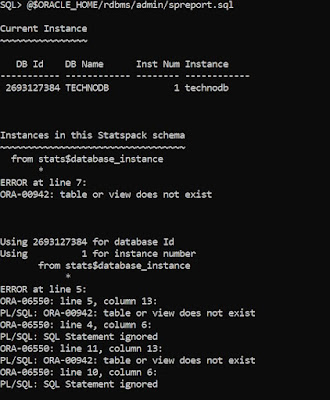Statspack is important tool for dba to investigate performance issue in
oracle database, it makes DBA's life easy in performance issues cases. Most of
the time, statspack is not installed automatically unless it is specified in
custom script prepared from database creation.
The question is how to check if statspack is installed or not? There
are number of ways to detect that, we will discuss few here
1. PERFSTAT user
statspack uses PERFSTAT user to perform its operation, so check in
DBA_USERS whether user is present of not using select * from dba_users where
USERNAME='PERFSTAT';
2. Presence of table STATS$DATABASE_INSTANCE
statspack generates snap id's and save information in table STATS$DATABASE_INSTANCE,
and table is created during installation of statspack, check using desc STATS$DATABASE_INSTANCE
if table is present, if present then statspack is installed otherwise not
3. Running report using spreport.sql
For DBA's convenience, there are number of scripts provided by oracle in
admin folder under oracle home directory, spreport.sql is such script used
to generate statspack report , try running this sql file, if it asks for begin
snap id and end snap id then assume statspack is installed otherwise it will
throw error.



